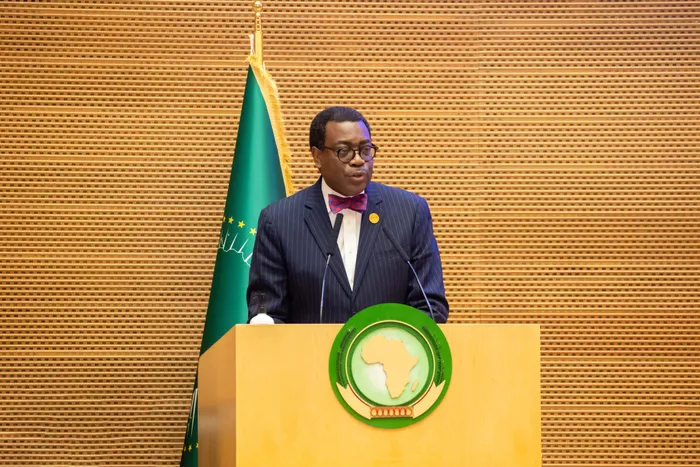Challenging landscape awaits new AfDB leadership
AFRICA'S DEVELOPMENT

AfDB President Akinwumi Adesina addressing the 38th Ordinary Session of the African Union Assembly in Addis Ababa, Ethiopia on February 16, 2025.
Image: AfDB Archives
Dr. Sizo Nkala
THE search for the African Development Bank (AfDB)’s 10th president is on.
The AfDB will hold elections for a new president on May 29 during its Annual Board of Governors Meeting. The current president, Akinwumi Adesina’s second and final term as president of the Bank will lapse in August. Four candidates are in the race to replace him.
These include Amadou Hott from Senegal, Samuel Maimbo from Zambia, South Africa’s Swazi Tshabalala, and Sidi Ould Tah from Mauritania. The winning candidate will have to secure a double majority of the votes from the bank’s 54 regional (African) members on the one hand, and the collective of regional and non-regional members will secure another majority from the regional and the 27 non-regional members combined.
Among the bank’s non-regional members are the United States, China, the Netherlands, Germany, France, and Saudi Arabia. The winning candidate will have to secure the support of some of the bank’s largest shareholders in the regional list, namely Nigeria, Egypt, South Africa and the Ivory Coast, who by their significant shareholdings enjoy more voting powers.
The US, Japan, Germany and Canada are among the largest shareholders in the non-regional list, which gives them a decisive influence on the outcome of the elections.
Since its establishment in 1964, the AfDB has emerged as one of the premier African development finance institutions at the forefront of addressing the continent’s development challenges by promoting economic growth and eradicating poverty.
To that end, the Bank has played a critical role in mobilising finance and resources for infrastructure projects across Africa that are designed to foster regional integration and stimulate economic growth. The AfDB stands out as one of the few success stories of pan-African institutions, the majority of which have largely suffered a stillbirth.
Boasting a modest capital of US$300 million when it was founded in 1964, the Bank now has a capital base of over US$300 billion. Its capital base has more than tripled since Adesina took over in 2015 – a testament to his prowess in mobilising capital and growing the bank’s stature. It has also earned a triple-A ranking from international credit ratings agencies – a rare feat in the African context and something which has eluded the BRICS New Development Bank (NDB).
In its 60-year history, the AfDB has granted loans for over 4400 projects and operations across Africa, including highways, railways, ports, plantations, oil pipelines, water and sanitation infrastructure, telecommunications, and power plants, to mention a few.
In 2023 alone, the Bank approved 180 projects worth a total of US$10.8 billion, with transport, energy, finance and agricultural sectors attracting over 75 percent of the projects reflecting the Bank’s High 5 Goals which include lighting up, feeding, industrializing, integrating, and improving the quality of life in Africa.
Moreover, the AfDB has played a crucial role in providing technical services for development projects in African countries and also helping some countries navigate periods of debt distress and financial crisis.
However, the candidate who will emerge victorious in this month’s elections will have to confront several challenges facing the continent. Africa remains the poverty capital of the world, with over 400 million people still living in extreme poverty.
Of all the world’s regions, the continent has recorded the lowest performance in terms of the realisation of the United Nations’ Sustainable Development Goals (SDGs). The region will need to raise US$1.3 trillion to realise the SDGs by 2030, which is impossible in the current circumstances. Africa’s infrastructure financing needs range between US$181 billion to US$221 billion for the period 2023-2030, but the financing is over US$100 billion as African countries have failed to mobilise capital for infrastructure projects.
Further, Africa is facing a debt crisis with the amount spent on debt servicing having ballooned from US$17 billion in 2010 to US$74 billion in 2024, racking up 11 per cent of the total revenues. Such exorbitant debt servicing amounts end up starving critical sectors like education, health and water and sanitation of resources, thus worsening the poverty levels among the ordinary people.
Moreover, the new president of the AfDB will have to find ways of revitalising and reinvigorating the African Continental Free Trade Area (AfCFTA) project, which seems to be losing steam almost five years after its launch. Without trade and market integration envisaged under the AfCFTA it will be difficult for the Afdb itself to live up to its mission.
Hence, the incoming president will have their work cut out for them. However, due to the work that has been done by their predecessors, they will have a solid base on which to build.
Some of their priorities will include expanding the capital base of the bank, mobilizing finance from public and private sources, working with the more than a dozen debt-distressed countries escape their financial crises, and consolidating the African position in the Finance Ministers and Central Bank Governors track of the G20 which is being presided over by South Africa.
* Dr. Sizo Nkala is a Research Fellow at the University of Johannesburg’s Centre for Africa-China Studies.
** The views expressed do not necessarily reflect the views of IOL, Independent Media or The African.